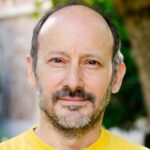Link to Pubmed [PMID] – 25944859
MBio 2015;6(3):e00354-15
UNLABELLED: Legionella pneumophila, the etiological agent of legionellosis, replicates within phagocytic cells. Crucial to biogenesis of the replicative vacuole is the Dot/Icm type 4 secretion system, which translocates a large number of effectors into the host cell cytosol. Among them is LegK2, a protein kinase that plays a key role in Legionella infection. Here, we identified the actin nucleator ARP2/3 complex as a target of LegK2. LegK2 phosphorylates the ARPC1B and ARP3 subunits of the ARP2/3 complex. LegK2-dependent ARP2/3 phosphorylation triggers global actin cytoskeleton remodeling in cells, and it impairs actin tail formation by Listeria monocytogenes, a well-known ARP2/3-dependent process. During infection, LegK2 is addressed to the Legionella-containing vacuole surface and inhibits actin polymerization on the phagosome, as revealed by legK2 gene inactivation. Consequently, LegK2 prevents late endosome/lysosome association with the phagosome and finally contributes to remodeling of the bacterium-containing phagosome into a replicative niche. The inhibition of actin polymerization by LegK2 and its effect on endosome trafficking are ARP2/3 dependent since it can be phenocopied by a specific chemical inhibitor of the ARP2/3 complex. Thus, LegK2-ARP2/3 interplay highlights an original mechanism of bacterial virulence with an unexpected role in local actin remodeling that allows bacteria to control vesicle trafficking in order to escape host defenses.
IMPORTANCE: Deciphering the individual contribution of each Dot/Icm type 4 secretion system substrate to the intracellular life-style of L. pneumophila remains the principal challenge in understanding the molecular basis of Legionella virulence. Our finding that LegK2 is a Dot/Icm effector that inhibits actin polymerization on the Legionella-containing vacuole importantly contributes to the deciphering of the molecular mechanisms evolved by Legionella to counteract the endocytic pathway. Indeed, our results highlight the essential role of LegK2 in preventing late endosomes from fusing with the phagosome. More generally, this work is the first demonstration of local actin remodeling as a mechanism used by bacteria to control organelle trafficking. Further, by characterizing the role of the bacterial protein kinase LegK2, we reinforce the concept that posttranslational modifications are key strategies used by pathogens to evade host cell defenses.


